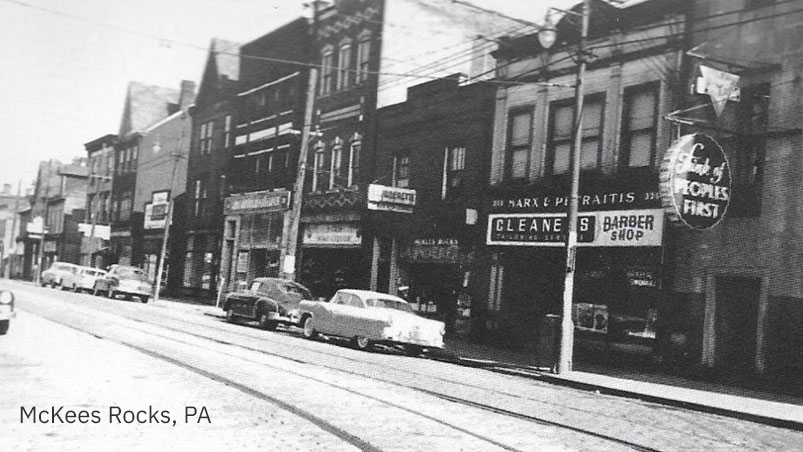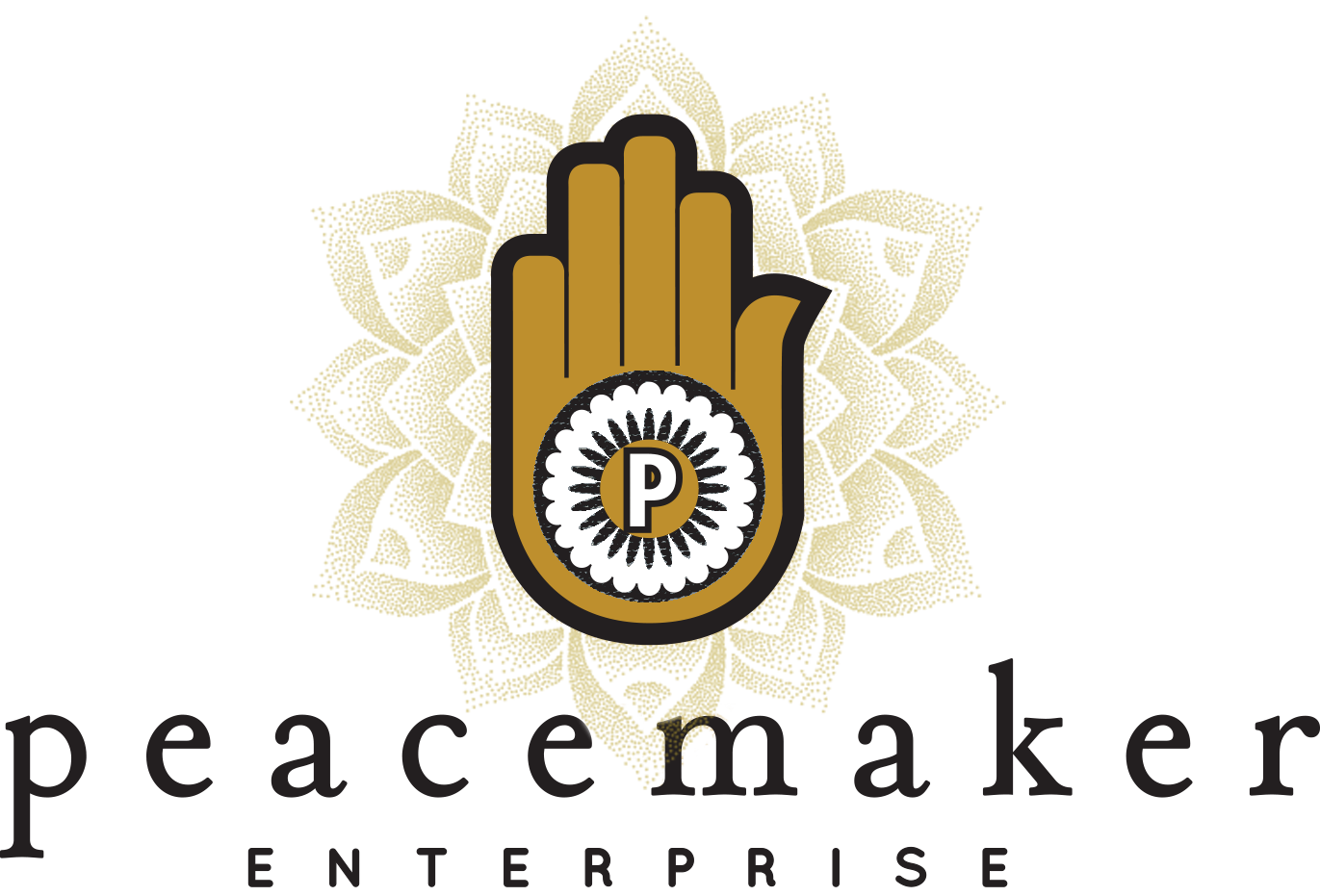There has been long-term collateral damage and an ongoing psychic wound which deserves to be healed with Radical Self-Care and by providing the emotional resources for the personal as well as the collective well-being of African American communities. Mark Wolyn teaches that “traumatic memories are transmitted through chemical changes in DNA”. There is a need to understand the conscious and unconscious inheritance of terror and systemic racism long-term.
Writing “My Father’s Silence” is the short story about story about my family system. It reflects the epigenetics of a family and the humanity of all families.

My Father’s Silence by Hitaji Aziz
I grew up right outside of Pittsburgh, Pennsylvania in a town called McKee’s Rocks in the 1950s. McKee’s Rocks was a large Italian community with smaller pockets of old world European immigrants. We also had Gypsies, Jews, one Chinese family and even smaller pockets of Blacks that had migrated from the south and its terrors.
I was born out of one of those Black families that migrated from the same place where they were owned. Their plantation was based in Evergreen, Alabama. The journey was headed by my great grandmother Sally and her husband William Liddell who died just before they reached Pittsburgh in the late 1920s. They were part of the great migration of ex-slaves and Blacks looking for more freedom and less terror. They were running; running hard for their lives, leaving all their possessions, except what they could pack and what they wore on their backs. My father’s family got to there on the same emotional journey, migrating from Atlanta, Georgia; running for a dream called Pittsburgh.
My father, Jack Kirkland, was one the first African American men to be hired in the steel mill near our government owned low-income housing in those days. We called them the “projects” and it was the first time we had an indoor toilet. We lived by the sounds of the steel mills. The sirens of the steel mills were always in the background of our lives. We always knew when the work shift started and when it ended. Being hired in the mill was a big thing for a Black man in those days of the 50s and 60s.
My dad was a chronic alcoholic and wounded so deeply that he had lost all of his social compassions by the time I was born in 1953. He rarely ever smiled and when he did he was usually drunk. If he did smile it was a smile of shame, rage, terror, pain and he would never be able to understand the complexity of trauma and depression that co-created his pain and his living. Today he would be classified as depressed but no one talked about trauma and depression in those days and no one talked about a man being deeply sad, especially a Black man. He was naturally traumatized just by growing up in Georgia in the 20s, 30s and 40s where lynching and terrorist attacks were as common as the air he breathed.
Every working day right after he clocked out you could see him rigidly walking with lunch pail in hand to his mother’s house to start the daily after-work-drinking-binge that would last for hours. His mother, Grandma Vasey ran a “Speakeasy” out of her apartment to make ends meet which was a common activity in our community. He was a man who was bonded to his suffering and chronic depression; sexually addicted and a classic workaholic.
One day he accidentally cut his finger off at the mill and his boss had to force him to leave. Terrified that he would not be able to return, my father was convinced that he could still work with the loss of his finger and needed no medical attention. He was known to be a hard worker, always on time and never late for work yet always late in being a father. On pay day my mother would send me to grandma Vasey’s house to ask him for money. The eighteen dollars taken out of his check was never enough to make ends meet on her disability check she received for having a stroke. My dad always had money for drinking, gambling, women and nothing for a daughter in need. I remember sitting there for hours in a room filled with drunken Black men; silently overwhelmed waiting for him to just notice that I was there while literally watching dollar bills fall out of his pockets. There were no words for “children of alcoholics” back in those days.
My dad lived by a different definition of manhood than the general White population of poor white men; both groups have been historically silent about depression. He had to carry an extra layer of shame by being the grandson of slaves. It was not popular to be a Black man and it was never safe. You could be killed any time and for any reason. Like I said, he grew up poor in Georgia and impending death or the possibility of dying based on race was a norm for Black men.
I understand now why my dad was so messed up. He was profoundly disappointed with life. He was always afraid and brokenhearted. His medication was alcohol, work, women and anything he could do to take the edge off of the rage and terror that walked with him every day. I suspect he was an incest survivor by the way he acted out sexually. His whole world reflected this terror and you could see the same terror in the eyes of his drinking buddies.
My father was one of my first sexual perpetrators along with several of those drinking buddies. Sexual abuse within my family is another story to be told. It was not unusual for them to ask or act like I was his “woman” instead of a young girl in elementary school who looked just like her dad. I was called “little Jack”. He would even pee in front on me on the side of the street. When shopping for school clothes he would not hesitate to steal in front of me. One time I even saw him arrested for stealing. Another time when he tried to steal in a store I started to cry and asked him if Jesus would do that and he stopped although he was pissed off. On top of all of this I would usually end up holding his hand to cross both of us across the street because of his drunkenness. I was my dad’s little mother; a parent, a child and a sexual object.
His sadness usually took on the faces of rage, violence, resentment and coldness; mostly coldness and detachment. Sometime when he was growing up he accepted the message that said that men in general are not considered real men if they showed their true feelings and allowed themselves to become vulnerable. Somewhere and some place shame had taught him as a little colored boy that it was too dangerous to be real and human.
My father grew up with a mixed and confusing message. The historical message was that my dad was a descendent of people who were considered only 3/5 human in the early development of this country, so how could he ever be a good-enough-man; there was an energetic ceiling placed on his humanity. The other part was that as a man you were not shown how to own your own devastation as a human other than acting it out in destructive ways. Yet another part was about their sexism and that women were often objectified as a form of medication.
He internalized this message as part of his core self. My father was not raised to see life with passion and dreams to be pursued. His life was more about survival and his future held no real meaning. He lived never knowing when his life would end, based on the color of his skin. He would never be good enough nor did he expect it. Along the road he managed to internalize enough illusion and oppression that he believed the myth and messages of the shame. He was what he thought he was and he manifested those thoughts every day.
The majority of the men in my family were alcoholics and they were depressed, violent and deeply sad like dad. They took out this depression and sadness on their families. They were the first terrorist that I was ever exposed to. When I was a little girl pretending to sleep I would hear them only come to my grandmother Bessie and they would cry in the wee hours of the night about racism, the N -word and they would share with her their fears and the most vulnerable parts of who they were only to rise in the morning detached, cold and smiling that kind of smile that only drunk men can do. Once again, they were men and men had to stay strong by all means.
It all came together when I was a teenager that something was critically wrong with the men in my family and my family in general when my cousin Jean was beaten to death by her husband James. Death-by-beating was never attached to her death and it was said the she “just did not wake up that morning”. We sat there in the church; a church where James was the deacon viewing Jean’s body and still no one could really name what had happened. We knew she had been beaten to death after many bloody beatings. We could never name my cousin James’s depression and mental illness after a thousand times of hearing him cry in the wee hours of the night only to rise early in the morning cold, detached and smiling that smile that drunk men do.
I sometimes wonder how it would be if we had known how to hear them with deeper attention. I wonder what it would have been like if they could have named their depression, their terror, their emotional pain and their addictions. I wonder how things would have been if they had the opportunity to experience a kind and gentle compassion from a society that saw them as invisible and less than. I wonder how their lives would have turned out if they knew how to define their own dreams and passions outside of addiction and violence. I wonder how it would have been if the women in my family would have been empowered not to cosign the insanity.
I miss the father I never had. I miss having a safe father. I still fantasize how it would feel to have a father be proud of you. I forgive my father for the many days that I had to be his mother as a child. I forgive him for the sexual abuse for I am too worthy to carry such a huge resentment. I forgive him for shaming me and for never saying the word love. I forgive him for never hugging me and for never making it safe to be his child. I forgive him for his coldness and the many days of embarrassments. I forgive him for that smile.
I forgive myself for the many men I tried to make be my father. I forgive myself for being attracted to the many men who were just like my father. I forgive myself for the many years of depression and self-abuse; thinking and acting that I was less than human.
In the legacy of my father and the men and women of my family I promise with intent to remember that all little boys and girls are worthy of deep attention, respect and kind compassion for their sacredness and divine spirits.
